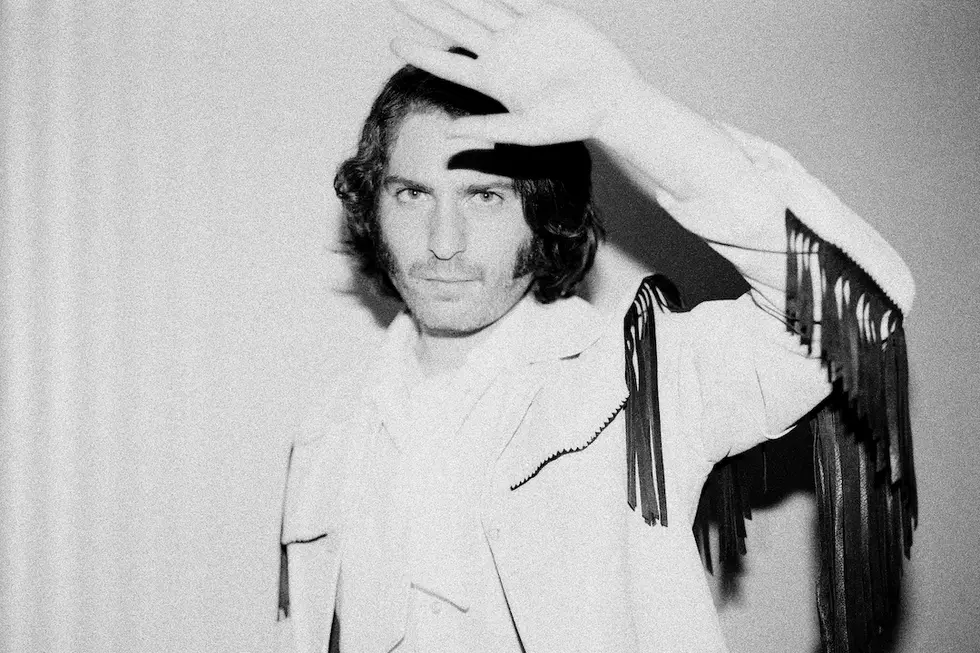
Interview: Logan Ledger Makes His Own Version of Retro Country on Debut Album
Logan Ledger’s self-titled record is a doorway into a world of surrealistic folk. Tonally dark, its vibrant texture consists of sounds from different spheres of American roots music woven into a cohesive whole.
Logan Ledger's lyrical content focuses on the intangible, spinning webs of otherworldly fantasies while still tapping into the lovelorn sorrow of old-time country singers. Ledger’s sound is certainly retro by definition, but not in the neo-traditional country revivalist sense: With his T Bone Burnett-produced debut, he’s in a league of his own.
Ledger’s unique style is due in part to his vast knowledge of -- and genuine curiosity about -- music history. He never sets out to replicate anything from the past, but rather to incorporate it into his music, even if it's on the unconscious level. The San Francisco native began playing guitar around the age of 10, which spurred a lifelong pursuit of music in many capacities.
“My guitar teacher was sort of an eccentric bohemian kind of character who lived in a house that had literal trees growing through it," Ledger tells The Boot. "He introduced me to a lot of stuff: He introduced me to different films and books. I think his way of getting me to learn to play basic chords on the guitar [was giving] me a Bob Dylan songbook. That was kind of my intro to the idea of folk music.
"I was like, 'Where did this stuff come from? Where did Dylan get this stuff from?'" he continues. "So I went on a nerd quest: For a long time, I was just really into folk music. With my allowance, I went to Borders and bought every Smithsonian Folkways CD I could find.”
Influences such as Mississippi John Hurt piqued Ledger's interest in fingerpicking, while Doc Watson ignited his love for bluegrass, which he’s played most of his life. He picked up the banjo and other instruments, and eventually hosted a country radio show in New York.
When Ledger moved to Nashville in 2013, he found his scene within the left-of-center American Legion Post 82 crowd -- the East Nashville venue hosts, among other events, the weekly Honky-Tonk Tuesday -- playing in traditional country bands. Burnett plucked Ledger out of obscurity in 2016, and helped kickstart his solo career, after hearing some demos that Dennis Crouch added bass to and passed along.
While traditional country is something that Ledger enjoys and respects -- especially the archivist angle, which keeps the style alive -- he wants to expand when it comes to his own music. “On some level, what I’m doing now is a reaction to who I was three or four years ago," Ledger notes.
"I started digging a little deeper into thinking, conceptually, who do I actually want to be as an artist here?” he explains. “So from the get-go, I was like, 'I’m not gonna make some sort of throwback country record.' You could just put on Hank Williams if you wanted to listen to classic country music. You gotta do something different."
"From the get-go, I was like, 'I’m not gonna make some sort of throwback country record.' You could just put on Hank Williams if you wanted to listen to classic country music. You gotta do something different."
Burnett recruited longtime collaborators Marc Ribot and Jay Bellerose, along with Crouch -- the backing band for Robert Plant and Alison Krauss’ 2007 album Raising Sand, released by Ledger's label, Rounder Records -- to record at House of Blues Studios. There were two years between their meeting and the actual making of the album, so Ledger and Burnett built a working relationship that allowed for efficiency once they were in the studio; during that time, Ledger played shows in Burnett's band and honed his solo live set.
“There wasn’t a lot of sitting around, thinking about what we should do," Ledger says of his time in the studio with Burnett. "I think we cut three songs each day. For the most part, they were all live vocals and minimal overdubs, which is philosophically T Bone’s thing.
"He helped me very much to keep to an aesthetic direction and keep all the material we chose in line with the specific vision that would work," Ledger adds. "He played on the whole album, so he literally put tones on the record that wouldn’t have been there otherwise.”
Their intent to create a unified sound with Ledger’s medley of influences is clear on Logan Ledger. The record covers a lot of ground and is exempt from being categorized into one era, combining SoCal psychedelia with the Bakersfield sound and modern songwriting with smooth Western swing and jazz phrasing. He channels a Roy Orbison lull on “Electric Fantasy,” George Jones’ bravado on “Imagining Raindrops” and the haunting richness of Eddie Noack on his cover of “Skip a Rope.”
“It’s sort of the culmination of a lot of different threads of my life,” Ledger says.
More From TheBoot









